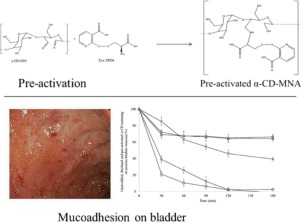The study was designed to synthesize and characterize pre-activated α-cyclodextrin (α-CD) derivatives as mucus adhering excipients for intra-vesical drug delivery. Sodium periodate (NaIO4) was used to oxidize α-CD and subsequently cysteamine was covalently attached to carbonyl groups of oxidized α-CD via reductive amination to produce thiolated α-CD. L-cysteine-2-mercaptonicotinic acid conjugate (Cys-MNA) was covalently attached to carbonyl groups of oxidized α-CD to produce pre-activated α-CD having enhance stability against oxidation at higher pH. Thiolated and pre-activated α-CD derivatives were quantitatively assayed for the attached thiol groups and MNA groups, respectively. Cell viability and tolerability was evaluated via resazurin assay and via red blood cells (RBC) lysis assay, respectively. Mucoadhesive properties were evaluated on porcine bladder mucosa. Trimethoprim (TMP) was encapsulated into thiolated and pre-activated α-CD derivatives and the dissolution behavior was evaluated in vitro. Thiol groups attached to thiolated α-CD derivatives α-CD-SH780 and α-CD-SH1426 were 780 ± 68 μmol/g and 1426 ± 66 μmol/g, respectively. For the entirely pre-activated α-CD derivatives, α-CD-MNA3609 and α-CD-MNA4285 number of attached MNA groups were 3609 ± 19 μmol/g and 4285 ± 43 μmol/g, respectively. Thiolated and pre-activated derivatives of α-CD did not show adverse effects to cells determined via resazurin and RBC lysis assays. Mucoadhesion on porcine bladder mucosa was significantly improved for thiolated and pre-activated α-CD derivatives. Thiolated α-CD-SH1426 showed 15-fold and pre-activated α-CD-MNA4285 showed 25-fold improved mucoadhesion compared to unmodified α-CD. Further, pre-activated α-CD-MNA4285 showed 2-fold enhanced dissolution of encapsulated TMP compared to free TMP over 3 h. The study shows that pre-activated α-CD could be an excipient of the choice for the formulations of mucoadhesive intra-vesical drug delivery systems.
- Home
- Blog
- News
- Basics
- Sources
- Agencies, Regulatory & Organisations
- CERSI Excipients Browser
- Excipient Report
- Excipient DMF List
- EXCiPACT Certified Companies
- Excipient Documentation
- Excipient EINECS Numbers
- Excipient E-Numbers
- FDA Inactive Ingredient List
- FDA GRAS Substances (SCOGS) Database
- IPEC Americas
- USP - U.S. Pharmacopeia
- Definitions
- Whitepapers / Publications
- Supplier
- Services
- Media
- Events
- 1st pharmaexcipients Poster Award
- Event Calendar
- Events featured by pharma-excipients
- 4th Annual Formulation & Drug Delivery Congress
- DDF Summit
- ExcipientFest Americas
- ExcipientFest Asia
- Global CompliancePanel
- International Conference and Exhibition on Pharmaceutics & Novel Drug Delivery Systems
- Formulation & Drug Delivery USA Congress
- Laboratory Medicine 2018
- Making Pharmaceuticals Europe
- Making Pharmaceuticals Exhibition
- Pharma Integrates
- PharmaExcipients China @CPhI China
- TTC Technology Training Center
- Jobs
- Online Sourcing
- Contact

